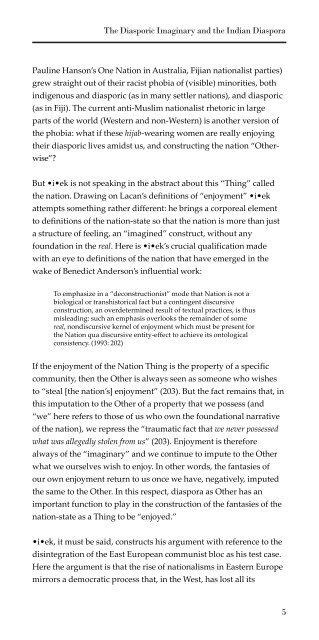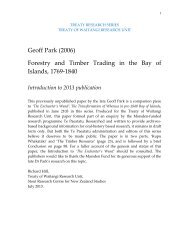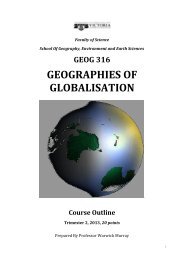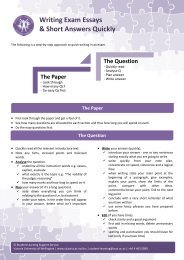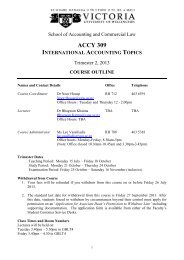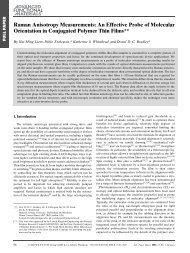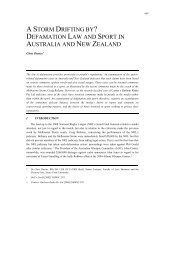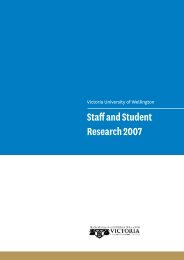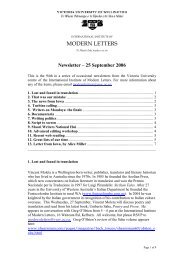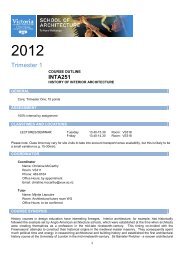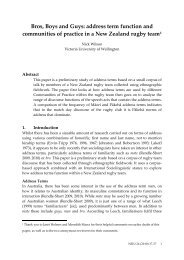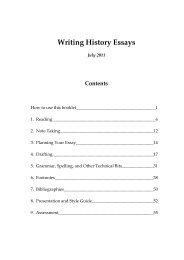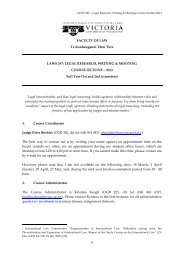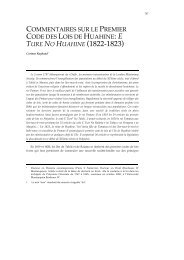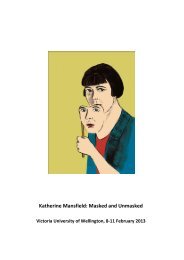The Diasporic Imaginary and the Indian Diaspora - Victoria ...
The Diasporic Imaginary and the Indian Diaspora - Victoria ...
The Diasporic Imaginary and the Indian Diaspora - Victoria ...
You also want an ePaper? Increase the reach of your titles
YUMPU automatically turns print PDFs into web optimized ePapers that Google loves.
<strong>The</strong> <strong>Diasporic</strong> <strong>Imaginary</strong> <strong>and</strong> <strong>the</strong> <strong>Indian</strong> <strong>Diaspora</strong><br />
Pauline Hanson’s One Nation in Australia, Fijian nationalist parties)<br />
grew straight out of <strong>the</strong>ir racist phobia of (visible) minorities, both<br />
indigenous <strong>and</strong> diasporic (as in many settler nations), <strong>and</strong> diasporic<br />
(as in Fiji). <strong>The</strong> current anti-Muslim nationalist rhetoric in large<br />
parts of <strong>the</strong> world (Western <strong>and</strong> non-Western) is ano<strong>the</strong>r version of<br />
<strong>the</strong> phobia: what if <strong>the</strong>se hijab-wearing women are really enjoying<br />
<strong>the</strong>ir diasporic lives amidst us, <strong>and</strong> constructing <strong>the</strong> nation “O<strong>the</strong>rwise”?<br />
But •i•ek is not speaking in <strong>the</strong> abstract about this “Thing” called<br />
<strong>the</strong> nation. Drawing on Lacan’s definitions of “enjoyment” •i•ek<br />
attempts something ra<strong>the</strong>r different: he brings a corporeal element<br />
to definitions of <strong>the</strong> nation-state so that <strong>the</strong> nation is more than just<br />
a structure of feeling, an “imagined” construct, without any<br />
foundation in <strong>the</strong> real. Here is •i•ek’s crucial qualification made<br />
with an eye to definitions of <strong>the</strong> nation that have emerged in <strong>the</strong><br />
wake of Benedict Anderson’s influential work:<br />
To emphasize in a “deconstructionist” mode that Nation is not a<br />
biological or transhistorical fact but a contingent discursive<br />
construction, an overdetermined result of textual practices, is thus<br />
misleading: such an emphasis overlooks <strong>the</strong> remainder of some<br />
real, nondiscursive kernel of enjoyment which must be present for<br />
<strong>the</strong> Nation qua discursive entity-effect to achieve its ontological<br />
consistency. (1993: 202)<br />
If <strong>the</strong> enjoyment of <strong>the</strong> Nation Thing is <strong>the</strong> property of a specific<br />
community, <strong>the</strong>n <strong>the</strong> O<strong>the</strong>r is always seen as someone who wishes<br />
to “steal [<strong>the</strong> nation’s] enjoyment” (203). But <strong>the</strong> fact remains that, in<br />
this imputation to <strong>the</strong> O<strong>the</strong>r of a property that we possess (<strong>and</strong><br />
“we” here refers to those of us who own <strong>the</strong> foundational narrative<br />
of <strong>the</strong> nation), we repress <strong>the</strong> “traumatic fact that we never possessed<br />
what was allegedly stolen from us” (203). Enjoyment is <strong>the</strong>refore<br />
always of <strong>the</strong> “imaginary” <strong>and</strong> we continue to impute to <strong>the</strong> O<strong>the</strong>r<br />
what we ourselves wish to enjoy. In o<strong>the</strong>r words, <strong>the</strong> fantasies of<br />
our own enjoyment return to us once we have, negatively, imputed<br />
<strong>the</strong> same to <strong>the</strong> O<strong>the</strong>r. In this respect, diaspora as O<strong>the</strong>r has an<br />
important function to play in <strong>the</strong> construction of <strong>the</strong> fantasies of <strong>the</strong><br />
nation-state as a Thing to be “enjoyed.”<br />
•i•ek, it must be said, constructs his argument with reference to <strong>the</strong><br />
disintegration of <strong>the</strong> East European communist bloc as his test case.<br />
Here <strong>the</strong> argument is that <strong>the</strong> rise of nationalisms in Eastern Europe<br />
mirrors a democratic process that, in <strong>the</strong> West, has lost all its<br />
5


